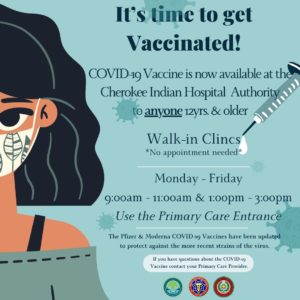COVID-19
News & Updates for the Community



COVID-19
Public Health and Human Services would like to remind you to follow the CDC’s COVID guidelines to protect yourself and others. If you have further questions/concerns, please feel free to contact the PHHS Team at 359-6240 or 359-6180.
-
- STAY AT HOME IF YOU ARE SICK!
- Get tested for COVID-19 if needed. If you are eligible for services at Cherokee Indian Hospital Authority, free COVID test kits are available for pick up at the emergency room desk. Please wear a mask if symptomatic!
- Follow CDC recommendations: Isolate and take precautions if you have or suspect you have COVID-19 (attached)
- WASH YOUR HANDS!!
Link: Isolate and take precautions if you have or suspect you have COVID-19 https://www.cdc.gov/coronavirus/2019-ncov/downloads/your-health/isolation-print-resource-final.pdf
Link: 10 Things you can do to manage your COVID symptoms at home: https://www.cdc.gov/coronavirus/2019-ncov/downloads/10Things.pdf
Link: Don’t Delay: Test Soon and Treat Early https://www.cdc.gov/coronavirus/2019-ncov/downloads/communication/print-resources/Test-Soon-Treat-Early.pdf
Elderly and those who are severely immunocompromised may want to take additional precautions, such as:
-
- Wear a well-fitting, high-quality mask or respirator
- Avoid poorly ventilated or crowded indoor settings
- When indoors with others, try to improve ventilation as much as possible
- And wash their hands often with soap and water or use a hand sanitizer that contains at least 60% alcohol
COVID-19 Vaccine

COVID-19 Vaccine is now available at the Cherokee Indian Hospital Authority to ANYONE 12yrs. & older!
Walk-in Clinic Hours are Monday – Friday 9:00am – 11:00am & 1:00pm – 3:00pm.
Public Health & Human Services
43 John Crowe Hill Rd.
PO Box 666
Cherokee, NC 28719
828-359-6180
Hours: Monday-Friday
7:45 am – 4:30 pm

Disclaimer
EBCI Public Health and Human Services (PHHS) use a variety of social media options to communicate and interact with the public. Those sites and applications include popular social networking and media sites, such as Pinterest, Facebook, Instagram and Twitter. These social networking and media sites are operated by a third party, therefore your activity on these third party sites is governed by the security, privacy policy, and user agreements of those sites, which we have linked to below.
You should review the third-party security, privacy policies, and user agreements before using the sites and ensure that you understand how your information may be used. If you have an account with a third-party Web site, and choose to follow, like, friend, or comment certain information associated with your account may be made available to PHHS based on the privacy policy of the third-party Web site and your privacy settings within that third-party Web site. Therefore, you should also adjust privacy settings on your account to match your preferences.
It is the policy of PHHS that any comments that contain spam or are improper, inflammatory, off-topic or offensive shall be removed. Repeat offenders may be subject to banning.
EBCI PHHS strives to make the information contained on these third party sites as timely and accurate as possible, PHHS makes no claim, promise, or guarantee about the accuracy, completeness, or adequacy of the contents on these third party sites, and expressly disclaims liability for errors and omissions in the contents of these sites. Items posted on these third party sites do not necessarily reflect the views or act as endorsements by EBCI PHHS.
